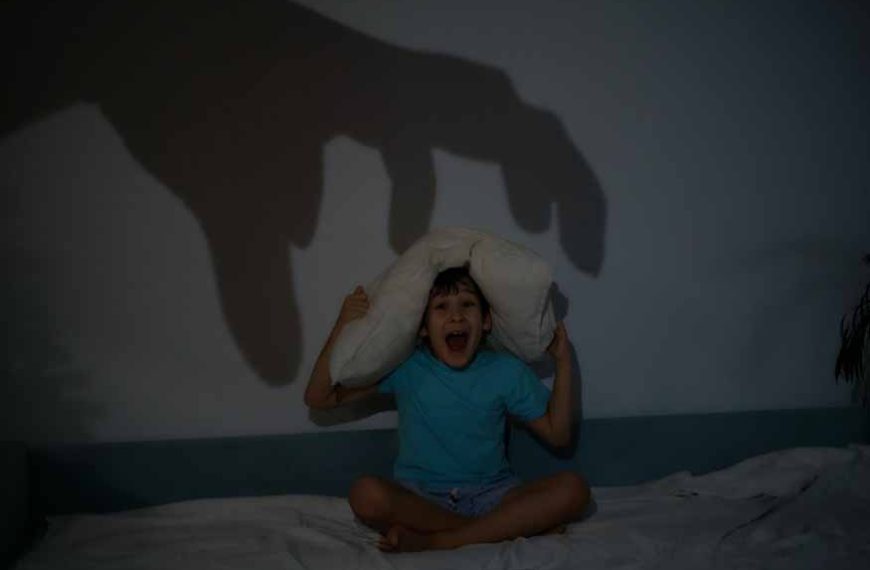If your child wakes up in the middle of the night, squirming around, sleepwalking, or murmuring, they may have a nightmare episode. The threat of nightmares, night terrors, and sleepwalking in children can make bedtime distressing for many parents. But in general, these nightmares are quite common.
According to research, at least 70% of young children experience nightmares and the frequency of nightmares peaks in later childhood. In this article, we will explore the causes behind these nighttime episodes and, more importantly, effective relief strategies to alleviate them. Let us embark on a journey to ensure restful nights for both parents and their little ones.
Understanding the Nighttime Phenomena
Nightmares:
Nightmares are vivid, frightening dreams that can cause a child to wake up feeling scared or anxious. They are a common part of childhood and often derive from normal developmental fears, exposure to scary media, or changes in routine.
Decoding Night Terrors
Night terrors are intense episodes of fear that occur during non-REM (rapid eye movement) sleep. They often leave children in a state of confusion and panic, making it essential to discern them from nightmares for proper intervention.
Navigating Sleepwalking
Sleepwalking adds another layer of complexity. Almost one-third of children will sleepwalk at some point. Developing successful alleviation techniques requires an understanding of the causes and potential triggers.
Common Causes of Nightmares in Children
- Anxiety and Stress:
- Medications:
- Fever and Illness:
- Developmental Stages:
- Imagination and Creativity:
- Emotional Processing:
- Sleep Environment:
- Media Exposure:
Children, like adults, can experience stress and anxiety. Academic pressures, social interactions, or family changes may contribute to the development of the condition of nightmares.
In some cases, medications may induce vivid dreams or nightmares in children. It is important to consult with a healthcare professional if you suspect a connection between medication and nightmares.
Physical ailments, especially those accompanied by fever, can lead to nightmares. Monitoring your child’s health and providing appropriate care can help alleviate this cause.
Children go through various developmental stages, each accompanied by changes in cognitive and emotional processing. These changes can influence the scope and frequency of nightmares.
A child’s vivid imagination and creativity can contribute to the intensity of nightmares. Nurturing these qualities along with providing reassurance is the key to helping them navigate these imaginative realms.
Nightmares can be a way for children to process and understand complex emotions. Encouraging open communication about their feelings can aid in alleviating emotional stressors.
Sleep environment can be a strong cause of these situations. Creating a calm and secure sleep environment is crucial in preventing nightmares. Pay attention to factors like lighting, noise, and comfort to promote a restful night’s sleep.
In today’s digital age, children are exposed to various media sources. Monitor the content they consume, as certain images or themes may contribute to nightmares.
Effective Relief Strategies for Nightmares, Night Terrors, and Sleepwalking
- Creating a Comforting Bedtime Routine:
- Ensuring a Comfortable Sleep Environment:
- Implementing Relaxation Techniques:
- Limit Exposure to Scary Content:
- Seeking Professional Guidance:
- Implement a Wake-up Routine for Night Terrors:
- Ensure Safety Measures for Sleepwalking:
- Open Communication with the Child:
Establishing a soothing bedtime routine can work wonders. Dimming the lights, engaging in calming activities, and reading a bedtime story can help children transition into a relaxed state before sleep.
A child’s sleep environment plays a significant role in their nighttime experiences. From cosy bedding to a quiet and dark room, optimising the sleep space can contribute to more peaceful nights.
Teaching children relaxation techniques, such as deep breathing or visualisation, empowers them to manage stress and anxiety. These techniques serve as invaluable tools for navigating the challenges that may lead to nighttime disturbances.
Be mindful of the content your child consumes, including television shows, movies, and books. Limit exposure to content that may be too scary for their age, and encourage positive and calming alternatives.
When persistent or severe, it is essential to seek professional guidance. Consulting with a paediatrician or child sleep specialist can provide tailored insights and strategies based on the child’s unique situation.
If your child experiences night terrors, it may be helpful to gently wake them approximately 15 minutes before the expected time of the night terror. This can interrupt the sleep cycle and reduce the likelihood of an episode.
If your child sleepwalks, take precautions to ensure their safety. Install gates on stairs, remove obstacles from their path, and consider using a bell on their bedroom door to alert you if they leave their room during the night.
Encouraging open dialogue about their dreams and fears encourages a trusting relationship. This communication provides insights into their emotional state and allows for targeted support. Create a safe space for them to share their fears and anxieties, making it easier to address the root causes of nightmares or night terrors.
Alleviating nightmares, night terrors, and sleepwalking in children requires a multifaceted approach. By understanding the different phenomena, implementing effective relief strategies, and adopting the human touch via shared experiences and expert advice, parents can pave the way for restful nights and happy mornings.
As you undertake this quest for better sleep, choosing an educational environment that nurtures your child’s holistic development is necessary. EuroKids, a leading name in preschool education, provides a safe, supportive, and engaging learning atmosphere for young minds.
Consider EuroKids as your partner in nurturing the potential within your child, providing them with the tools and experiences necessary for a bright and promising tomorrow. Learn more about EuroKids and discover the difference in early childhood education at the best playschool in India. Sweet dreams and a bright future await your little one!
Frequently Asked Questions about Nightmares in Children
Q1. Is sleepwalking common in children, and what triggers it?
Sleepwalking can be relatively common in children. Triggers may include sleep deprivation, fever, certain medications, or it can be a family history of sleepwalking.
Q2. Are there specific activities or practices that can reduce the likelihood of nightmares?
- Create a bedtime routine
- Limit exposure to scary content
- Encourage positive bedtime stories
- Create a comforting sleep environment
- Open communication with the child
Q3. What role does a comfortable sleep environment play in preventing sleep disturbances?
A comfortable sleep environment includes a dark, quiet room at a comfortable temperature, with soft sleepwear and bedding, promoting a sense of security.
Q4. How can I differentiate between nightmares and night terrors in my child?
Nightmares are vivid dreams that cause fear and can be remembered, whereas night terrors involve sudden episodes of intense fear during non-REM sleep. Recognising the differences helps in providing appropriate support.
Q5. How can I encourage my child to share their fears and anxieties about sleep without causing more distress?
Open communication is important. Develop a safe and non-judgmental space for your child so that he/she can express their feelings. Discover effective communication strategies to address nighttime fears.
Q6. Are there any long-term consequences if childhood nightmares, night terrors, or sleepwalking are left untreated?
Addressing these disturbances early is essential. While most children outgrow these experiences, untreated sleep issues may impact overall well-being. Learn about potential long-term consequences and the importance of timely intervention.
Q7. How can a consultation with a paediatrician or child psychologist can help me?
A consultation with a paediatrician or child psychologist offers valuable insights and guidance. These professionals can provide a holistic approach to addressing nightmares and related issues.
Q8. What role does a consistent bedtime routine play in alleviating night time disturbances?
A consistent bedtime routine establishes a sense of security and relaxation for a child, contributing to better sleep quality. Parents should try to create an effective routine to minimise night time disturbances.















